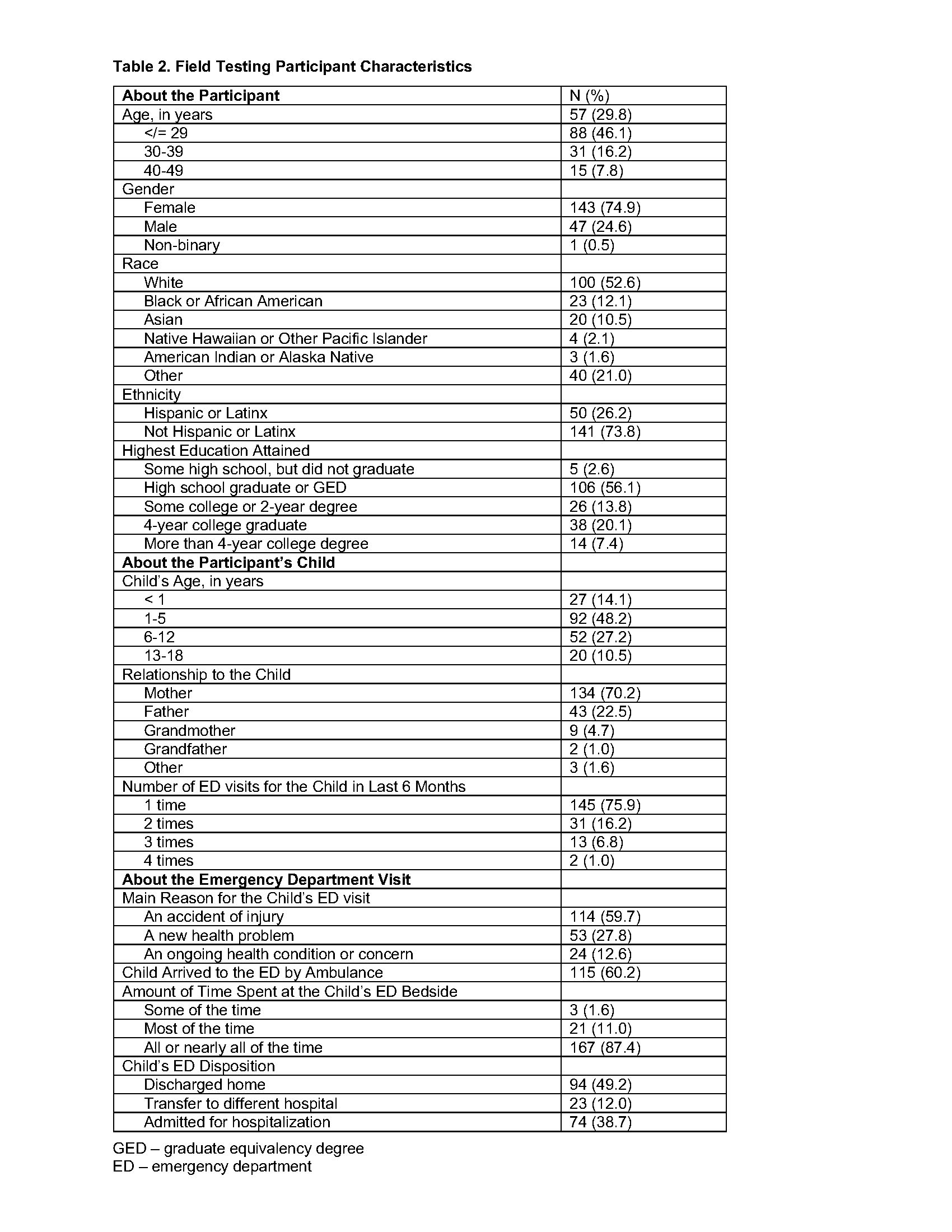Emergency Medicine: All Areas
Category: Abstract Submission
Emergency Medicine X
382 - Development and Psychometric Evaluation of a Family Caregiver-Reported Survey to Assess Family-Centered Care in the Emergency Department
Sunday, April 24, 2022
3:30 PM - 6:00 PM US MT
Poster Number: 382
Publication Number: 382.314
Publication Number: 382.314
Jennifer Rosenthal, University of California Davis, Sacramento, CA, United States; Daniel J. Tancredi, University of California, Davis, School of Medicine, Sacramento, CA, United States; Susan Perez, California State University, Sacramento, Davis, CA, United States; Anthony Albano, University of California, Davis, Davis, CA, United States; Heather M. Young, University of California Davis Betty Irene Moore School of Nursing, Ashland, OR, United States; Patrick S. Romano, UC Davis Center for Healthcare Policy and Research, Sacramento, CA, United States

Jennifer Rosenthal, MD, MAS (she/her/hers)
Associate Professor
University of California, Davis, School of Medicine
Sacramento, California, United States
Presenting Author(s)
Background: Most family-centered care measures lack adequate validation, and no family-centered care assessment tool is designed to be used for a pediatric emergency department (ED) encounter.
Objective: To develop and evaluate the psychometric properties of a family caregiver-reported survey that assesses family-centeredness of care in the context of pediatric ED encounters.
Design/Methods: We drafted a preliminary caregiver-reported scale to measure family-centered care provided by the child’s ED doctors. We revised it based on content expert feedback. We then iteratively revised it based on cognitive interviews with caregivers. Finally, we field tested the survey (Table 1) with caregivers. For scoring, we converted the items into dichotomous top-box items. We obtained a summary score by summing the number of items with the most positive response option, dividing it by the total number of items completed, and multiplying by 100. We analyzed/performed internal consistency reliability, item response theory, exploratory factor analysis, and convergent validity with the ED Consumer Assessment of Healthcare Providers and Systems (CAHPS) survey.
Results: Among the 9 experts, none highlighted missing content. Four items were removed and 1 revised based on expert feedback. We conducted 16 cognitive interviews and revised the survey in 4 rounds. The survey was field tested among 191 caregivers (mode: 28% in person, 31% paper, 40% electronic). Table 2 shows respondent characteristics. Mean (SD) summary score for each respondent was 77.2 (26.6). Mean top-box score ranged from 61.2 to 95.3%. Two items had poor internal consistency and low variability, with top-box scores greater than 95% (items 10 and 11). Cronbach’s alpha and omega reliability coefficient for the full scale were 0.85 and 0.86, respectively. We removed items 10 and 11 given inconsistent response patterns, poor variability, and poor internal consistency. Item characteristic curves for items 1-9 had steep slopes, indicating effective discrimination. Parallel analysis indicated that 2 factors should be retained in the 9-item scale for the principal factor analysis (Table 3). Factors 1 and 2 had an estimated correlation of 0.87. Regarding convergent validity, adjusted partial correlation between our scale’s 9-item summary score and the ED CAHPS summary score was 0.75 (95% CI 0.67–0.81).Conclusion(s): Psychometric analyses demonstrated good item performance, reliability, and convergent validity of a 9-item scale. This survey can be used to assesses family-centeredness of care in the ED for research and quality improvement purposes.
Field Tested Survey Instructions and Items.jpg)
Field Testing Participant Characteristics
Objective: To develop and evaluate the psychometric properties of a family caregiver-reported survey that assesses family-centeredness of care in the context of pediatric ED encounters.
Design/Methods: We drafted a preliminary caregiver-reported scale to measure family-centered care provided by the child’s ED doctors. We revised it based on content expert feedback. We then iteratively revised it based on cognitive interviews with caregivers. Finally, we field tested the survey (Table 1) with caregivers. For scoring, we converted the items into dichotomous top-box items. We obtained a summary score by summing the number of items with the most positive response option, dividing it by the total number of items completed, and multiplying by 100. We analyzed/performed internal consistency reliability, item response theory, exploratory factor analysis, and convergent validity with the ED Consumer Assessment of Healthcare Providers and Systems (CAHPS) survey.
Results: Among the 9 experts, none highlighted missing content. Four items were removed and 1 revised based on expert feedback. We conducted 16 cognitive interviews and revised the survey in 4 rounds. The survey was field tested among 191 caregivers (mode: 28% in person, 31% paper, 40% electronic). Table 2 shows respondent characteristics. Mean (SD) summary score for each respondent was 77.2 (26.6). Mean top-box score ranged from 61.2 to 95.3%. Two items had poor internal consistency and low variability, with top-box scores greater than 95% (items 10 and 11). Cronbach’s alpha and omega reliability coefficient for the full scale were 0.85 and 0.86, respectively. We removed items 10 and 11 given inconsistent response patterns, poor variability, and poor internal consistency. Item characteristic curves for items 1-9 had steep slopes, indicating effective discrimination. Parallel analysis indicated that 2 factors should be retained in the 9-item scale for the principal factor analysis (Table 3). Factors 1 and 2 had an estimated correlation of 0.87. Regarding convergent validity, adjusted partial correlation between our scale’s 9-item summary score and the ED CAHPS summary score was 0.75 (95% CI 0.67–0.81).Conclusion(s): Psychometric analyses demonstrated good item performance, reliability, and convergent validity of a 9-item scale. This survey can be used to assesses family-centeredness of care in the ED for research and quality improvement purposes.
Field Tested Survey Instructions and Items
.jpg)
Field Testing Participant Characteristics

